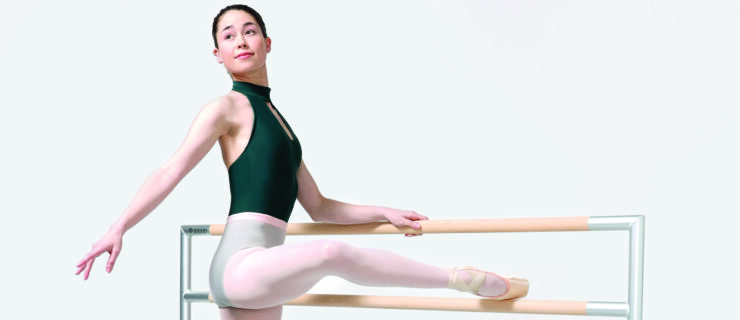Dealing with Criticism
Picture yourself in class, admiring your reflection in the mirror after you finally execute a quadruple pirouette. You’ve been working to master this move for months and now it’s finally happened! You feel both pride and relief as you gracefully land in fourth position and glance over at your teacher to see if she noticed. “Keep your shoulders away from your ears,” she says before moving on to appraise the next student’s work. Your good mood is destroyed. No matter how hard you try, it seems like your dancing always has problems.
Sometimes a steady stream of corrections can leave you feeling overwhelmed, leading you to lose sight of your love for the art form. But every dancer must learn to deal with these remarks. So how can you learn to handle critiques confidently and calmly? Here are four ways to make criticism constructive, rather than destructive.
1. Remember the Reason Why
You go to dance class because you want to get better. And, as dance psychologist Linda Hamilton points out, “to improve in anything, we need feedback to know what is working and what isn’t.”
Try not to take criticism personally, especially when it relates directly to your technique. Getting negative feedback doesn’t mean you aren’t talented—even professionals get criticized. The key, says San Francisco Ballet principal Vanessa Zahorian, is to remember that your teacher or coach is on your side. “Sometimes you look at a video and think, ‘I wish someone had told me to turn out!’ Coaches use pointers to make you look the best you can before you get onstage,” she says.
2. Consider the Source
If you’re feeling bombarded by criticism, take a moment to prioritize. A technique-related comment from a teacher usually carries more weight than a note from a peer or a parent. Similarly, if you’re in rehearsal for a specific piece, the choreographer probably has the final word on how steps are performed.
Technique- or performance-related comments are different from remarks about your body—the latter will probably hurt more, even if they’re intended to help you. So, how do you know when to take body-related comments seriously? That’s where delivery matters. If your teacher speaks to you in private and respectfully suggests cross-training, that’s worth listening to more than a peer, parent or overzealous costume mistress commenting that you must have really enjoyed your birthday cake last week. (See “When Criticism Goes Too Far,” at right, for more on weeding out harmful critiques.)
Although your teacher or company director is in charge, don’t automatically discount advice that comes from other sources. “If you’re in class with a leading dancer who happens to notice something and takes you aside, that’s useful, too,” Hamilton says. For example, if a fellow dancer shares how she overcame a similar technical problem, it might give you a new angle from which you can attack your issue. However, if a note from a peer runs counter to something you’re working on with your teacher, speak to your teacher before making the change.
3. Learn When to Let Go
Your first instinct after getting in-class criticism might be to practice a problematic move again and again. But sometimes, no matter how hard you try to incorporate the correction into your body, it isn’t going to happen that day. And that’s okay! Sleep on it, and look at the issue through fresh eyes later. Though your technical issue may be the result of something you can’t necessarily fix—short Achilles tendons or tight hip sockets, for example—odds are your body just needs time to adjust.
Taking a break to problem-solve isn’t the same as giving up. “Think about why something isn’t working,” Hamilton advises. “Maybe there’s a learning curve, and you need to give yourself time to pick it up. Maybe there’s a weakness that could be corrected with cross-training. Or maybe it’s just an off day, in which case, leave it alone and go back to it later.”
Also, remember that being a dancer isn’t always about pleasing others. During her run on “So You Think You Can Dance,” after several weeks of tough criticism from the judges, Karla Garcia got a much-needed reminder of why she was there. “The week I was kicked off,” she says, “Desmond Richardson was performing. Before I went on to dance my solo, I was disheartened and asked him, ‘What do I do? Everyone’s watching.’ Desmond said, ‘You’re a performer. You have to block all that out. They don’t exist. This time is about you taking the stage.’ I went on after that and gave the best performance [of my time on the show]. I wish I had thought about just enjoying being onstage from the very beginning!”
4. Be Kind to Yourself
Handling criticism with maturity and positivity requires inner strength. You have to try to love yourself as you are and forgive yourself when something isn’t progressing as fast as you’d hoped. Easier said than done, right? But think of it this way: As a dancer, you’re never done learning. Once you overcome one challenge, you’ll discover another.
“It’s important to use the drive for perfection in a productive way,” Hamilton says. “Excessive self-criticism can sabotage your goals by making you push through pain or hate everything you do. After a while, this often leads to depression and injuries.” Instead of becoming frustrated, reframe the issue by learning to work within your body’s limitations. Hamilton recommends asking your physician for an orthopedic screening to learn how your body can perform to its best potential.
As you progress in your training, remember that you are your most important critic. “Stay humble, but know that what you think of yourself is the thing that matters most,” Garcia says. “That has helped me develop a tough skin throughout my career. People have different tastes, and there will always be someone with something negative to say. Just be your best dancer—and your best person—and enjoy taking the stage.”
When Criticism Goes Too Far
In November 2010, New York Times critic Alastair Macaulay rocked the dance world when he wrote in a review of The Nutcracker that New York City Ballet principal Jenifer Ringer “looked as if she’d eaten one sugar plum too many.” Macaulay’s comment spawned countless angry responses and blog posts from readers who felt he’d gone too far. Ringer responded by essentially pointing out that her physique wasn’t compromising her ability to perform, and moved on.

Ringer as the Sugar Plum Fairy (courtesy Erin Baiano/Paul Kolnik Studio)
As the Macaulay-Ringer debacle shows, not all criticism is meant to help you grow. Unfortunately, throughout your dance career, you’ll come across authority figures, peers and even observers who criticize without considering your best interests and/or psychological well-being. While it’s good to know how to rise above this type of situation and stay positive, like Ringer did, you also need to know how to deal when criticism goes too far.
According to dance psychologist Linda Hamilton, if your teacher, company director or choreographer repeatedly humiliates you, yells or curses at you, or devalues you as a person, she is behaving inappropriately. If a teacher overloads you with corrections, gets angry with you when you can’t fix everything immediately, or calls you lazy, that person is taking criticism to an unnecessarily personal level.
Before you take drastic steps toward meeting your teacher’s demands—for instance, starting an over-the-top exercise regimen—get a second opinion. If you feel comfortable with another teacher at your school, run the criticism by her. Ask your physician or a dance medicine professional if you can healthfully change your physique—or if you even need to.



